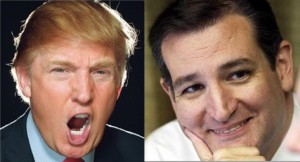Ted Cruz understands that resurrecting American greatness must mean restoring the Constitution
 Republican voters have a very stark choice facing them: Do they vote for the candidate who promises to resurrect American greatness through the power of his will, or do they vote for the candidate who promises to resurrect American greatness by recognizing the Constitution’s centrality in American governance? Maybe I’m being foolishly reductionist, but the answer to that question seems to lie within the question itself: You cannot “resurrect” America unless you first resurrect the Constitution to its rightful place in American politics.
Republican voters have a very stark choice facing them: Do they vote for the candidate who promises to resurrect American greatness through the power of his will, or do they vote for the candidate who promises to resurrect American greatness by recognizing the Constitution’s centrality in American governance? Maybe I’m being foolishly reductionist, but the answer to that question seems to lie within the question itself: You cannot “resurrect” America unless you first resurrect the Constitution to its rightful place in American politics.
I don’t doubt that Trump will fulfill his promises to undo some of the damage Obama has done, both at home and abroad. And I fully understand the appeal of a candidate who seems likely to carry out an agenda with which a voter agrees.
The problem is that Trump’s free-wheeling stump promises, well-known history, and uber-alpha personality make it clear that he’ll carry out his promises the same way Obama did it: Through executive ukases, crony capitalism, and smearing his political opponents. There’s no room in Trump’s rhetoric for the Constitution. Indeed, as far as I can tell, the only allusion Trump has made during the primary season to the Constitution is to express support for the Second Amendment (and believe me, I appreciate that).
While it’s tempting to go for the quick and easy fix Trump promises, doing so betrays the Constitution and, in doing so, undercuts everything that makes America exceptional. The men who wrote the Constitution were trying to create a government free of Obama’s executive legislation, crony capitalism, and power plays through personal attacks — political sins that were all rife in British government in the 18th century. The Founders rightly understood that these malevolent government practices concentrated power and wealth in the hands of a small group of people, while denying liberty to each individual.
Had the Founder’s wished to, they could have gone the socialist root, which was already bubbling up through the Enlightenment, only to flower in the French Revolution. They understood that this approach to government had nothing to do with individual liberty. The only thing that a socialist government does is to transfer power from a monarchy to an all-powerful government body that purports to represent the people’s collective. Individuals in a socialist society have as little freedom and as few rights as individuals in any tyrannical system, whether its communist, monarchist, theocratic, or oligarchic.
That is, the Founders understood that switching rulers always leaves the way open for another tyranny. The only way to prevent tyranny is to change the government’s fundamental structure. That’s where the Constitution comes in, with its truly revolutionary approach to allocating power between the people and their government.
To keep government weak and individual liberties strong, the Founders created a government with divided powers so that no one branch could become too powerful, especially because they assumed that each branch would zealously guard its power from any encroachment by the other two branches. The Founders would have been horrified to see Americans, whom they envisioned as a collection of individuals, rather than a people’s collective, willingly vote for an executive who wants to aggregate power. They would have been even more horrified to see a Congress, whether because of laziness, cronyism, or fear, lie supine in the face of executive overreach.
Both the age of Obama and Trump’s astonishing rise to prominence show that too many Americans don’t understand that the Constitution’s entire thrust is towards individual liberty, not government power. The Constitution does not impose its obligations on “We, the People;” instead, it imposes them on the federal government itself.
Unlike laws, which are limitations that governments impose upon people, the Constitution is a contract by which the People impose limitations on the government. To that end, the main body of the Constitution defines a functioning limited government. It is structured to ensure that, when it functions properly, no single branch can function alone.
Once having structured a government that was theoretically immune to dictatorship, the Founders were then able to turn their attention to protecting the People’s unalienable under that government. They understood that, if the government can “giveth” something and then “taketh” it away again, that something is not a right; it is, instead, a mere privilege.
Rights belong to the People independent of government. The Constitution’s first ten amendments describe rights that are fundamental to the individual and, therefore, transcend government. The Founders stated them explicitly because they understood that even the most beneficent, well-intentioned government, once it got the bit between its teeth, could not be relied upon to protect these rights. It was therefore necessary to err on the side of caution by defining each individual’s inherent rights and warning federal government away from touching them.
Even more importantly, the Founders vested the most important power of all — the power of the purse — in the House of Representatives, which is the branch of government closely connected to each individual American. House members serve for much shorter terms than Supreme Court justices (life terms), executives (minimum 4 year terms) and Senators (minimum 6 year terms). In addition to a Representative’s short term of office, which means the people can quickly punish or reward legislative conduct, the House of Representatives mirrors population dynamics. The Senate is fixed at two representatives per state, there’s only one president, and there are nine Supreme Court justices. The House, by contrast, is reconfigured every ten years to represent accurately the number of people in various population centers and deserts throughout the U.S. All of this means that, if the People are not pleased with the government, they can quickly, and in proportion to their numbers, make their displeasure known through the House.
The Founders also envisioned each branch zealously guarding its power from any encroachment by the other two branches. They would have been horrified if they could have seen the current relationship between Congress and the White House. Since 2010, even though the majority in Congress was elected by citizens who disapproved of the executive branch’s overreach, a toxic blend of crony capitalism, corrupt collegiality, laziness, and craven fear has seen Congress willingly cede its power to the executive branch. Sadly, as Obama’s election showed and Trump’s candidacy promises, the People are just as ready as their Congress people to hand their rights over to a demagogue.
We’ve now had seven years to see what happens when people elect a charismatic leader who promises to carry out his agenda no matter what signals the People send when they vote for their Representatives and even their Senators. When the People made clear through Congressional elections that they did not like Obama’s agenda, Obama simply went it alone. He went it alone on border security, he went it alone on treaties, and he went it alone on Obamacare. Each time Obama did so, he not only damaged our national security and our economy, he damaged the liberty-focused constitutional underpinning that makes up American exceptionalism.
The fact that the next president can use that same presidential pen to rescind Obama’s overreaching executive orders does not remedy the situation. To begin with, Obama’s extra-constitutional acts have already caused profound damage that may take years or decades to remedy. Even worse, unless we elect as president someone whose first and last loyalty is to the Constitution rather than to the government, Obama will have set a precedent for executive overreach that, unchecked, will see political power in America devolve solely onto one person: the president. Another word for that kind of president is “dictator.”
We already know that Hillary and Bernie have no intention of allowing their administrations to be subject to constitutional limits. Whatever Obama did, they promise to do too, only more so. It’s also entirely reasonable to believe that Donald Trump doesn’t intend to limit himself either. He repeatedly makes clear that he’ll get things done through the power of his personality, through his manipulations, and through his will. The Constitution doesn’t fit into the repertoire of a man whose entire career has been based upon making a deal in whatever way he can. Trump may well do everything he’s promised, but at what cost to America?
As best as I can tell, Ted Cruz is the only candidate who has true reverence for the Constitution, seeing it as the sublime document that it is. He recognizes that it is the first and, so far, only document in the history of human kind that vests power, not in a monarchy, or an aristocracy, or an oligarchy, or a people’s collective, or a theocracy, but in each individual. The Constitution’s obsessive focus on the individual is why it is a bulwark against tyranny and why we must elect a president who understands that.
Ted Cruz will most certainly exercise his executive authority to void Barack Obama’s extra-constitutional legislative activities. After that, though, he’s been explicit about the fact that he will return power to the People through their representative legislative body, and that he will nominate to the Supreme Court justices who understand that the Constitution is meant primarily to create a limited government that preserves individual liberties.
A vote for Ted Cruz is not a vote for this agenda or that agenda. It is a vote for America itself. No matter how much you agree with Trump’s stated goals, please think twice about voting for a person who will be nothing more than a populist, vaguely conservative Obama. Ted Cruz has an admirably conservative agenda — strong national security, strong military, strong borders, free market capitalism not crony capitalism, freedom of worship, Second Amendment rights, friend to Israel, enemy to jihadist Islam — but he’ll implement it through the Constitution, not without it. Voting for Ted Cruz means that we’ll get the values we seek in a conservative president without destroying American exceptionalism and individual liberties.

